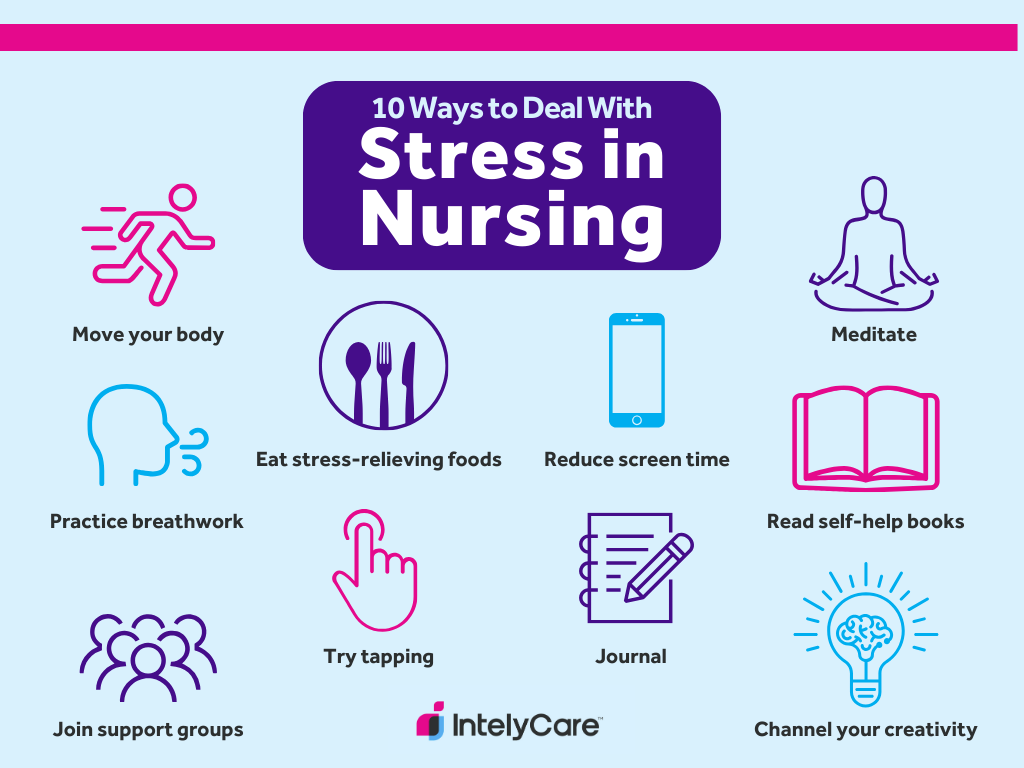10 Ways to Deal With Stress in Nursing

This is not exactly a newsflash, but it bears repeating: There’s a lot of stress in nursing. The long shifts, intense nature of the work, and fast pace can put a massive strain on your physical, mental, and emotional health. Over the years, several studies have documented the impact of work stress, but nurse stress is in a category all its own.
Stress, as per the World Health Organization (WHO), is one of the most significant health concerns on a global scale. Stress can cause ongoing restlessness, fatigue, burnout, feelings of helplessness, fear, and may even harm your immune system or organs.
One study found that nurses experiencing excessive stress from work had double the risk for a heart attack. Another study discovered that people who put in more than 55 hours per week had a 35% higher risk for stroke and a 17% higher risk of dying from ischemic heart disease than those who worked a more standard 35 to 40 hours per week.
Armed with that information, nurses face a myriad of potential poor health outcomes as the result of high stress levels at work. Suffice it to say, if you’re wishing you had better ideas for how to reduce stress in nursing, you’re not alone.
Stress in Nursing: Main Causes
Work-related stress has become a pervasive issue. For some nurses, the weight of the job can feel inescapable. Factors contributing to nurses’ job stress include:
- Complex job demands and needs
- High expectations
- Excessive responsibility
- Minimal authority
- Moral distress
- Incivility in nursing
Stress not only affects nurses’ well-being but can also impact their ability to provide the best, most compassionate care to their patients. Small acts of self-care can go a long way to help reduce stress in nursing and prevent compassion fatigue and burnout.

10 Practical Ways to Deal With Stress in Nursing
There are many options for dealing with stress as a nurse, but sometimes, it’s what you do away from work that can have a significant impact on the levels of anxiety you feel before each shift. Here are a few easy tips you can incorporate to build emotional intelligence, mitigate nurse stress, and improve your overall physical, mental, and emotional well-being.
1. Move Your Body
Exercise has psychological benefits in addition to physical ones. When we exercise, our body releases endorphins, chemicals that interact with receptors in our brain and trigger positive feelings in the body — which can improve physical and mental health.
But that doesn’t mean you have to get off the couch and start running marathons; there are many different exercises that can help reduce nurse stress, like yoga. Whether it’s a challenging yoga class or a slower, relaxing flow, yoga utilizes movements that improve circulation and help calm your mind.
Yoga not your style? Even taking a walk around the block with a friend can help improve cardiovascular and pulmonary fitness, as well as your mood. Whichever form of exercise you choose, it matters less how you move, and matters more that you move.
2. Eat Stress-Relieving Foods
Diet and nutrition play a large role in our ability to manage stress. Unfortunately, the Standard American Diet (SAD — a fitting abbreviation) is a major contributor to health issues, such as obesity, heart disease, and stress, in the U.S. SAD includes high intakes of red meat, pre-packaged foods, fried foods, high-fat dairy products, refined grains, and sugar.
To reduce stress, it is very important to eat healthy, incorporating nutrient-dense foods like vegetables, fruits, whole grains, beans, nuts, fatty fish, and lean proteins can help reduce and manage stress in nursing and in the rest of your life. Go easy on the alcohol and caffeine, and be mindful of drinking enough water.
With busy schedules, nurses can find it hard to shop, prepare, and consume healthier foods; it can be much easier to fall back on pre-packaged, grab-and-go food. Instead of a complete diet overhaul, focus on incorporating fresh, unprocessed foods into your routine, and look for healthier on-the-go options for the busy days. This will help to boost your energy level and strengthen your immune system.
3. Reduce Screen Time
With new healthcare technologies emerging every day, nurses spend more time looking at screens than ever before. This is especially true when it comes to social media — which is now proven to cause addiction that can result in depression. While these technologies aim to improve patient outcomes, they may actually be negatively impacting the professionals who look at them all day. Studies have found significant associations between screen time and moderate to severe depression in adults in the U.S.
To help manage stress in nursing, when you’re off the clock, try to reduce screen time to lessen the likelihood of eye strain, stress, anxiety, and depression. Employ time-management strategies to plan your days around your values. Enjoying time with family and friends, going outdoors, or reading a book are all fulfilling activities that avoid screens and can reduce nurse stress.
4. Meditate
Another option to try includes meditation for stress relief. If you’ve ever wondered how to meditate or said, “I can’t stop my thoughts during meditation,” don’t worry. Contrary to common belief, meditation isn’t about erasing your thoughts. Your mind naturally generates them. The key is not to act on every single thought. Just sit, wait, and observe.
This simple practice empowers you and provides wisdom. Why? Because many of your thoughts are often incorrect. Thoughts aren’t facts. If we don’t know that, we are in danger of making impulsive decisions based on wrong beliefs, leading to stress.
Sometimes, what we perceive as a high level of stress is often a matter of our perception, not the situation itself. It’s called catastrophizing, a common cognitive distortion. Meditation can help with this too. Try short guided meditations — like Deepak Chopra’s — for 21 days to see if it works for you.
5. Practice Breathwork
Breathwork, often seen as mystical, is actually pretty straightforward — it’s all about working with your breath. Despite misconceptions, it’s not a far-out spiritual practice; there are studies proving its stress-reduction benefits.
For instance, one study shows that slow breathing techniques enhance autonomic, cerebral, and psychological flexibility, leading to emotional control and psychological well-being.
It’s easy to practice. Just close your eyes and intentionally breathe slowly for 5–10 minutes, inhaling and exhaling at a snail’s pace. This triggers your parasympathetic nervous system, lowering your heart rate and blood pressure, while calming your mind.
Another technique to manage stress in nursing, diaphragmatic breath, has been shown to boost cognitive performance and reduce the negative effects of stress in healthy adults.
There are many breathwork techniques available online, including the Wim Hof method. Give it a try! Keep an open mind and experiment with various techniques to find the one that fits you best.
6. Try Tapping
Tapping is similar to acupuncture — minus the needles. This method, also known as emotional freedom technique (EFT), involves tapping certain areas of your body (meridian points) to send signals to your brain, adjusting hormone production. To put it simply, tapping reduces stress levels by activating parts of the brain that control stress.
It’s quite simple. Just find one of the guided tapping videos on the internet and follow along. This practice can take as little as five minutes and can be done at work during a stressful shift — even in the bathroom
7. Journal
Journaling is another great stress relief method. It’s proven to reduce mental distress and boost well-being, linked to fewer depressive symptoms, less anxiety, and increased stress resilience. The mental health benefits of journaling include:
- Decreased anxiety and obsessive thinking
- Diminished dwelling on past mistakes
- Heightened self-awareness
- Improved emotional regulation
- Expedited physical healing
It’s incredibly easy to get started; just grab a notebook and jot down your thoughts. Don’t hesitate to be candid — it’s for your eyes only.
The beauty of this technique is that you can do it anywhere, including at work. It’s a powerful way to recharge and release negative emotions, helping you respond to stressful work situations rationally rather than impulsively.
8. Read Self-Help Books
Have you ever heard of the term “bibliotherapy“? It’s a therapeutic method that involves reading helpful books alongside other healing modalities to improve mental health. It’s actually a well-documented method to treat depression.
David Burns, who is a big believer in bibliotherapy, wrote Feeling Good: New Mood Therapy. This book is an all-time self-help classic. You can dive into his book or check out many more self-help books. The choices are endless.
9. Join Support Groups
Let’s face it — we’re social creatures who need each other. In a culture that often emphasizes independence, it’s common to feel lonely, sad, and stressed. But what if we embrace the idea that we’re not meant to be independent, but interdependent?
That’s where support groups come in. The 12-step groups, originally created for alcoholics, have expanded to over 50 groups, including Neurotics Anonymous and Emotions Anonymous. They’re free, providing a safe space to share feelings and receive support.
Other resources include online chat-based support groups where you can connect with people dealing with similar issues.
10. Channel Your Creativity
Getting creative is a potent mood booster. It’s also used as a form of catharsis to let go of negative emotions, whether it’s through painting, singing, dancing, or another art form.
So, no matter your creative passion, use it as a stress-relief strategy. Don’t wait to feel inspired to create; Express yourself even on hard days. After all, some of the best songs we know are not positive at all. Creative activities help release negativity, reduce stress, and bring more peace to your life. Plus, who knows, your nursing-inspired art might make you a millionaire one day, so you won’t need to work again!
Releasing Stress in Nursing: Find What Works for You
There’s no single right way to tackle the many types of stress in nursing, and there’s no perfect solution, either. Whether it’s taking a convenient exercise class, preparing a healthy meal, or spending a screen-free day with your loved ones, the most important aspect of embracing self-care is taking time for yourself.
Sometimes, it’s not just about finding the best techniques; it’s about making changes in your life. If your job is a source of a non-stop high level of stress, consider talking to your nurse leader. You might be able to make changes like switching from night shifts to day shifts or reducing your work hours. In some cases, the only option is to change jobs. Luckily, there are many work environments where you can practice as a nurse — it’s just the matter of finding what works best for you.
Have a More Fulfilling Career
We know stress in nursing is a big problem. Want to find the kind of work that better fits your needs? Find out how IntelyCare can send you the latest nursing jobs that interest you.
Aislinn Twohig contributed to the writing of this article.
